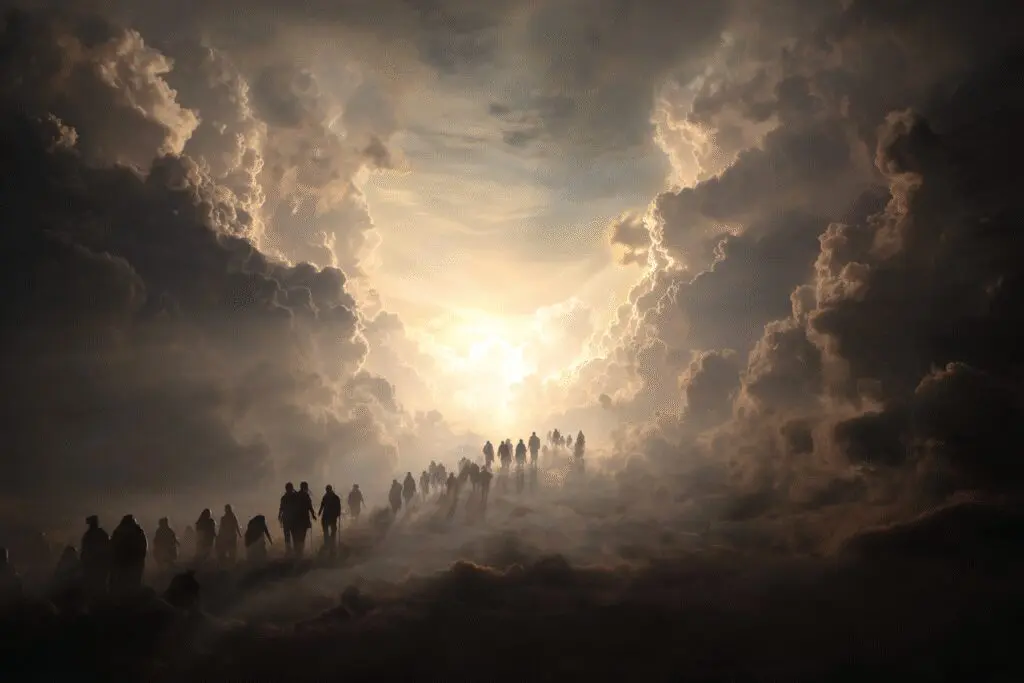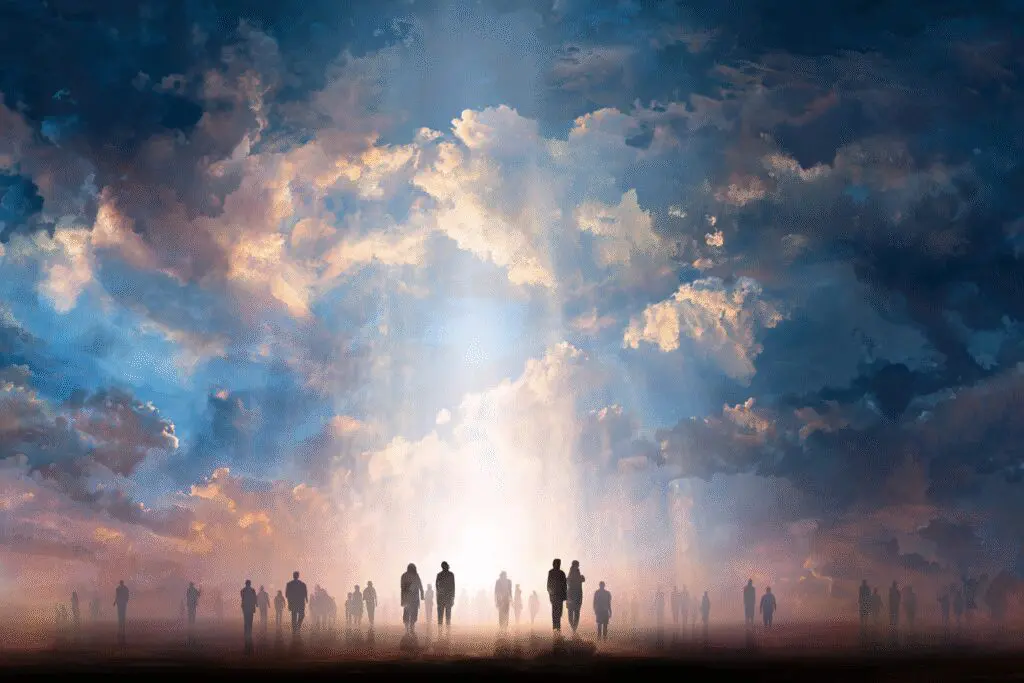Have you ever sat in a church service or a Bible study, heard the pastor or leader mention the “Rapture,” and a quiet question popped into your mind: “Where, exactly, is that in my Bible?” If you have, you are absolutely not alone. It’s a question many sincere believers have asked. We are told to be like the Bereans, who searched the Scriptures daily to see if what they were being taught was true. So, let’s do that together. Let’s open the Word and explore the core question: Where in the Bible does it speak of the Rapture?
This isn’t about diving into complex charts or debating timelines down to the minute. My goal here is much simpler and, I think, much more personal. It’s about looking at the actual verses that form the foundation of this incredible hope we have as Christians. It’s about seeing the promise of Christ’s return for His people, written right there in the pages of Scripture. We’re going to walk through the main passages, piece by piece, to build a clear picture of what the Bible says about this blessed hope.
More in Bible Category
What Does It Mean to Fear God in the Bible
What Does God Look Like in the Bible
How Is God Described in the Bible
Key Takeaways
For those who want the main points right away, here’s a quick summary of what the Bible teaches about the Rapture:
- The Word “Rapture”: The specific word “rapture” is not found in most English translations of the Bible. It comes from the Latin word rapiemur, which translates the original Greek word harpazō, meaning “to be caught up” or “snatched away.”
- The Main Passage: The clearest and most detailed description of the Rapture event is found in 1 Thessalonians 4:13-18. This passage describes believers being “caught up” to meet the Lord in the air.
- Instant Transformation: 1 Corinthians 15:50-57 explains that believers will be given new, glorified bodies “in a moment, in the twinkling of an eye.”
- Jesus’ Personal Promise: In John 14:1-3, Jesus Himself promises to come again to take His followers to the place He has prepared for them in heaven.
- A Comforting Hope: The doctrine of the Rapture was given to believers to be a source of immense comfort and encouragement, reminding us that we will be reunited with loved ones in Christ and will be with the Lord forever.
Is the Word “Rapture” Actually in the Bible?
This is the perfect place to start because it’s a major point of confusion for many people. If you search for the word “rapture” in a concordance, you likely won’t find it. So, does that mean the whole idea is unbiblical? Not at all.
The term we use comes to us through a journey of translation. The key verse, which we will look at in much more detail, is 1 Thessalonians 4:17. In the original Greek language of the New Testament, the phrase “caught up” is the word harpazō. This powerful word means to seize, to snatch away suddenly, or to take away by force.
When the Bible was translated into Latin in the 4th century (a version known as the Vulgate), the word harpazō was translated as rapiemur. From this Latin root, we get the English word “Rapture.”
So, while the specific English word isn’t there, the concept it describes—a sudden, physical “catching up” of believers—is absolutely present in the original text. It’s not about a single word, but about the event that the Word of God describes.
What is the Clearest Bible Passage Describing the Rapture?
When someone wants to understand the Rapture from the Bible, there is one place that stands as the cornerstone, the foundational passage that gives us the clearest picture of this future event. That place is 1 Thessalonians chapter 4.
Paul the Apostle was writing to a young church in Thessalonica. These new believers were passionate, but they were also worried. Some of their friends and family members who had accepted Christ had passed away, and they were concerned. Would their deceased loved ones miss out on Jesus’s return? Paul wrote this section of his letter specifically to comfort them and to give them a glorious hope to hold onto.
A Closer Look at 1 Thessalonians 4:16-17
Let’s read the key verses and then break them down.
“For the Lord himself will descend from heaven with a cry of command, with the voice of an archangel, and with the sound of the trumpet of God. And the dead in Christ will rise first. Then we who are alive, who are left, will be caught up together with them in the clouds to meet the Lord in the air, and so we will always be with the Lord.” (1 Thessalonians 4:16-17, ESV)
This is an incredible sequence of events!
- “The Lord himself will descend from heaven…”: This is not an angel or a representative. Jesus Christ Himself will come down from the Father’s right hand. It is a personal return for His people.
- “…with a cry of command, with the voice of an archangel, and with the sound of the trumpet of God.”: This is a moment of divine authority and triumphant announcement. It’s a call that will be heard by those for whom it is intended. The trumpet call in Scripture often signals a major event or a summons from God for His people.
- “And the dead in Christ will rise first.”: Here is the direct answer to the Thessalonians’ fears. Believers who have died will not be left behind. In fact, they get to go first! Their bodies will be resurrected and glorified.
- “Then we who are alive, who are left, will be caught up…”: This is the harpazō moment. Those who are believers and are still living on the earth at that time will be physically lifted off the ground.
- “…together with them in the clouds to meet the Lord in the air.”: This is a glorious reunion. The living believers and the resurrected believers will be joined together, and together we will meet our Savior not on the earth, but in the air. This is a key detail that distinguishes the Rapture from the Second Coming.
- “…and so we will always be with the Lord.”: This is the ultimate destination and the final promise. From that moment on, we will never again be separated from our Lord.
Why Did Paul Write This to the Thessalonians?
It’s so important to see the heart behind this passage. Paul wasn’t trying to create a complicated theological chart. He was offering real comfort to grieving people. He ends this section in verse 18 by saying, “Therefore encourage one another with these words.”
The truth of the Rapture is meant to be a source of profound hope and encouragement in our daily lives. It’s a reminder that death is not the end for a believer in Christ and that a glorious reunion awaits us.
What Happens to Our Bodies During the Rapture?
The passage in 1 Thessalonians tells us that we will be caught up, but another passage tells us how this is even possible. How can our frail, earthly bodies meet the Lord in the air and live in heaven forever? The Apostle Paul addresses this in his first letter to the Corinthian church.
He calls this transformation a “mystery”—something that was hidden in the past but has now been revealed by God.
Unpacking the “Mystery” in 1 Corinthians 15
In 1 Corinthians 15:51-52, Paul writes:
“Behold! I tell you a mystery. We shall not all sleep, but we shall all be changed, in a moment, in the twinkling of an eye, at the last trumpet. For the trumpet will sound, and the dead will be raised imperishable, and we shall be changed.”
Once again, we see several parallels with the 1 Thessalonians passage. The mention of “sleep” is a gentle way the Bible often refers to the death of a believer. And that familiar trumpet sound is there again, signaling this divine event.
How Fast Will This Transformation Happen?
Paul gives us a stunningly specific timeframe: “in a moment, in the twinkling of an eye.” This isn’t a slow, gradual process. It is instantaneous. It’s faster than a camera flash, faster than a blink. One moment, we are here in our mortal bodies, and the next, we are changed.
This incredible speed underscores the supernatural power of God at work. It is an event that defies our understanding of physics and biology.
What Kind of Body Will Believers Receive?
The passage goes on to explain the nature of this change. Paul says our mortal bodies must “put on immortality” and our perishable bodies must “put on the imperishable.”
- Perishable to Imperishable: Our current bodies are subject to decay, disease, and death. Our new, glorified bodies will be eternal and will never break down.
- Mortal to Immortal: Our current bodies have an expiration date. Our new bodies will be designed for eternity, never to experience death again.
This is the fulfillment of our salvation. It’s the moment our physical bodies are redeemed and made perfectly fit to dwell in the presence of a holy God forever.
Did Jesus Himself Ever Talk About the Rapture?
With such a significant future event, it’s natural to ask if Jesus Himself ever spoke about it. While He didn’t use the same terminology as Paul, He made a beautiful and personal promise to His disciples that perfectly aligns with the hope of the Rapture.
The setting is the Last Supper, found in the Gospel of John. Jesus has just told His disciples that He is going to leave them, and they are filled with confusion, fear, and sorrow. In this intimate moment, Jesus gives them one of the most comforting promises in all of Scripture.
What Was Jesus Promising His Disciples in John 14?
In John 14:1-3, Jesus says:
“Let not your hearts be troubled. Believe in God; believe also in me. In my Father’s house are many rooms. If it were not so, would I have told you that I go to prepare a place for you? And if I go and prepare a place for you, I will come again and will take you to myself, that where I am you may be also.”
Let’s soak in the personal nature of this promise.
- “I go to prepare a place for you.”: Jesus has a specific, prepared destination for us. Heaven is a real place, a home that our Savior is personally getting ready.
- “I will come again…”: This is His certain promise of return. It’s not a “maybe” or a “perhaps.” It is a definite future event.
- “…and will take you to myself.”: This is the essence of the Rapture. He isn’t sending an angel; He is coming Himself to gather His people. The purpose is relational—He wants us to be with Him.
- “…that where I am you may be also.”: The ultimate goal is eternal fellowship with Jesus.
This promise from our Savior is the bedrock. Paul’s later writings in 1 Thessalonians and 1 Corinthians simply provide more detail on how Jesus will fulfill this wonderful promise to come and take us to be with Him.
Are There Other Verses That Hint at the Rapture?
While the passages we’ve covered are the most direct, other verses in the Bible add color and depth to our understanding of this event. They support the idea that God will deliver His people before a time of future judgment on the earth.
The Concept of Being “Kept from the Hour of Trial”
In Jesus’s letter to the church in Philadelphia, one of the seven churches in the book of Revelation, He makes a specific promise. This church was known for its faithfulness and endurance.
In Revelation 3:10, Jesus says: “Because you have kept my word about patient endurance, I will keep you from the hour of trial that is coming on the whole world, to try those who dwell on the earth.”
Many Bible scholars see this “hour of trial” as a reference to the seven-year Tribulation period described later in Revelation. The promise to “keep you from” this period is seen by many as a promise of removal—that the faithful church will be taken out of the world before this time of worldwide judgment begins. For more in-depth study, the Dallas Theological Seminary offers a clear explanation of this event.
How is the Rapture Different from the Second Coming?
This is a critical point that helps clarify the timeline of events. The Bible speaks of two distinct future appearances of Christ.
- The Rapture:
- Jesus comes for His saints.
- He meets us in the air.
- It is a “snatching away” for the purpose of deliverance.
- It could happen at any moment and is an event that believers look forward to with hope.
- After the Rapture, believers are in heaven with the Lord.
- The Second Coming:
- Jesus comes with His saints (Revelation 19:14).
- He returns physically to the earth, with His feet touching the Mount of Olives (Zechariah 14:4).
- It happens at the end of the Tribulation period for the purpose of judging the world and establishing His earthly kingdom.
- It is preceded by specific signs and cosmic disturbances.
Seeing these as two separate events helps the entire prophetic timeline in Scripture make much more sense. The Rapture is the rescue mission; the Second Coming is the reign.
What Does Believing in the Rapture Mean for Us Today?
Understanding these verses is more than just an academic exercise. Believing that Jesus could return for us at any moment has a profound impact on how we live our lives right now.
It’s not about escapism, but about purification. The apostle John wrote, “And everyone who has this hope in him purifies himself, just as he is pure” (1 John 3:3). Knowing He could return today motivates us to live lives that are pleasing to Him.
It provides an unshakable hope in a world that often feels hopeless. When we watch the news or face personal trials, the promise of the Rapture is a firm anchor for our souls. It reminds us that this world is not our final home and that the best is yet to come.
Finally, it fuels our passion for sharing the Gospel. If we truly believe that Jesus is coming soon, it creates an urgency in our hearts for our friends, family, and neighbors to know Him. We want as many people as possible to be ready to meet Him when that trumpet sounds.
The promise of the Rapture is not a fringe doctrine for hobbyists; it is a central, motivating hope for every believer. It is the fulfillment of Jesus’s personal promise, a source of daily comfort, and the blessed hope that keeps us looking up, eagerly awaiting our Savior’s return.
Frequently Asked Questions – Where in the Bible Does It Speak of the Rapture

How should the belief in the Rapture influence how we live today?
Belief in the Rapture motivates Christians to live holy lives, sharing the Gospel with urgency, and comforting each other with the hope of eternal life. It encourages believers to stay prepared, live in purity, and eagerly anticipate being with Christ forever.
How can I understand the timing of the Rapture according to the Bible?
The Bible’s teaching on the timing of the Rapture varies among Christians. Main views include pre-tribulation, mid-tribulation, and post-tribulation. These differences focus on whether the Rapture occurs before, during, or after the Tribulation, but all agree on the event’s future occurrence.
Which Bible passages most clearly describe the Rapture?
The clearest verses about the Rapture are found in 1 Thessalonians 4:16-18 and 1 Corinthians 15:51-53. These passages describe Jesus returning, the resurrection of believers, the transformation of living believers, and the eternal reunion with Christ.
Where does the term ‘Rapture’ originate from, and is it in the Bible?
The word ‘Rapture’ does not appear in the original Greek Bible but comes from a Latin word used in 1 Thessalonians 4:17. The Greek word harpazō means ‘to snatch away,’ and the Latin translation ‘rapiemur’ means ‘we shall be caught up,’ from which the English term ‘Rapture’ is derived.
What does the Bible say about the event called the Rapture?
The Bible speaks of the Rapture as the moment when Jesus will come to meet His believers in the air. It involves believers who have died being raised first, and living believers being caught up to meet Christ, all while emphasizing the comfort and hope this brings to Christians.




